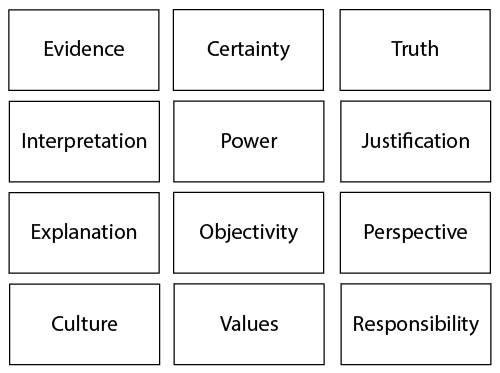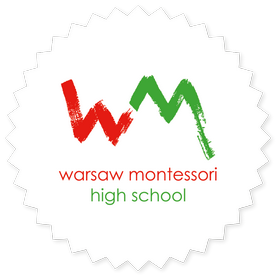The TOK course “at a glance”
The TOK course provides students with an opportunity to explore and reflect on the nature of knowledge and the process of knowing. It is a core element of the DP,
In TOK, students reflect on the knowledge, beliefs and opinions that they have built up from their years of academic studies and their lives outside the classroom. The course is intended to be challenging and thought-provoking—as well as empowering—for students.
The course centres on the exploration of knowledge questions, which are a key tool for both teachers and students. These are contestable questions about knowledge itself, such as:
“What counts as good evidence for a claim?”
“Are some types of knowledge less open to interpretation than others?”
“What constraints should there be on the pursuit of knowledge?”
The TOK curriculum is made up of three deeply interconnected parts.
- The core theme—Knowledge and the knower
This theme encourages students to reflect on themselves as knowers and thinkers, and to consider the different communities of knowers to which we belong.
- Optional themes
This element provides an opportunity to take a more in-depth look at two themes of particular interest to teachers and students. The given themes all have a significant impact on the world today and play a key role in shaping people’s perspectives and identities. Teachers select two optional themes from a choice of five: knowledge and technology; knowledge and language; knowledge and politics; knowledge and religion; and knowledge and indigenous societies.
- Areas of knowledge
The areas of knowledge (AOK) are specific branches of knowledge, each of which can be seen to have a distinct nature and sometimes use different methods of gaining knowledge. In TOK, students explore five compulsory areas of knowledge: history; the human sciences; the natural sciences; mathematics; and the arts.
There are two assessment tasks in the TOK course:
- The TOK exhibition assesses the ability of the student to show how TOK manifests in the world around us. The exhibition is an internal assessment component; it is marked by the teacher and is externally moderated by the IB.
- The TOK essay engages students in a more formal and sustained piece of writing in response to a title focused on the areas of knowledge. The essay is an external assessment component; it is marked by IB examiners. The essay must be a maximum of 1,600 words and must be on one of the six prescribed titles issued by the IB for each examination session.

Nature of the subject
The TOK course plays a special role in the DP by providing an opportunity for students to reflect on the nature, scope and limitations of knowledge and the process of knowing. In this way, the main focus of TOK is not on students acquiring new knowledge but on helping students to reflect on, and put into perspective, what they already know.
TOK underpins and helps to unite the subjects that students encounter in the rest of their DP studies. It engages students in explicit reflection on how knowledge is arrived at in different disciplines and areas of knowledge, on what these areas have in common and the differences between them. It is intended that through this holistic approach, discussions in one area will help to enrich and deepen discussions in other areas.
The course is an opportunity for students to engage in interesting conversations that cross the boundaries of individual disciplines and that help students to reflect on the knowledge they have acquired from both their academic studies and their lives outside the classroom. Students are encouraged to examine the evidence for claims and to consider, for example, how we distinguish fact from opinion, or how we evaluate the credibility of claims that we are exposed to in the media. They explore different methods and tools of inquiry and try to establish what it is about them that makes them effective, as well as considering their limitations.
The following 12 concepts have particular prominence within, and thread throughout, the TOK course: evidence, certainty, truth, interpretation, power, justification, explanation, objectivity, perspective, culture, values and responsibility. Exploration of the relationship between knowledge and these concepts can help students to deepen their understanding, as well as facilitating the transfer of their learning to new and different contexts.
The TOK course embraces the exploration of tensions, limitations and challenges relating to knowledge and knowing. However, it is also intended that TOK discussions will encourage students to appreciate and be inspired by the richness of human knowledge—and to consider the positive value of different kinds of knowledge. Consideration should be given to the benefits of this kind of reflection on knowledge and knowing; for example, in terms of its potential to help us think more subtly, to be more aware of our assumptions, or to overcome prejudice and promote intercultural understanding.
Aims
The aims of the TOK course are:
- to encourage students to reflect on the central question, “How do we know that?”, and to recognize the value of asking that question
- to expose students to ambiguity, uncertainty and questions with multiple plausible answers
- to equip students to effectively navigate and make sense of the world, and help prepare them to encounter novel and complex situations
- to encourage students to be more aware of their own perspectives and to reflect critically on their own beliefs and assumptions
- to engage students with multiple perspectives, foster open-mindedness and develop intercultural understanding
- to encourage students to make connections between academic disciplines by exploring underlying concepts and by identifying similarities and differences in the methods of inquiry used in different areas of knowledge
- to prompt students to consider the importance of values, responsibilities and ethical concerns relating to the production, acquisition, application and communication of knowledge.
TOK and univeristy admission
DP students have a distinct advantage over students studying other programmes when it comes to entering university – and at the centre of this is the TOK course.
As Howard Gardner, an educational psychologist at Harvard puts it, the IB Diploma helps student to “think critically, synthesize knowledge, reflect on their own thought processes and get their feet wet in interdisciplinary thinking.”
The demand for such skills in this world of information overload has never been more important, but the wonderful thing about the IB Diploma is that it has always taken the same approach to education as it did when it was first introduced in the late 1960s. As the Independent newspaper puts it, “The IB Diploma is a timeless classic, an icon of educational sense and high standards in a world where educational fashion shifts like hemlines, and much-needed clarity of thinking is elusive.” This means that the IB Diploma is “the best possible preparation for university, for the workplace, and more importantly, for life.”
Of course, one of the key reasons for the desirability of the IB Diploma from the point of view of colleges and universities is the theory of knowledge course. TOK is the element of the programme that most encourages critical thinking, “a sense of confidence and standing on your own two feet,” and an objective assessment of the different subjects that make up the Diploma. This is why the skills that you have built up as a TOK student are arguably your greatest asset when it comes to applying to university. As the Times Higher Education Supplement says, “Universities want students who can think in the abstract, and the IB’s theory of knowledge course… does just that.” So how do you make the most of these skills, and use TOK to help you win a place at your choice of university or college?
Sources
International education – International Baccalaureate, www.ibo.org
New York Times, Diploma for the ‘Top of the Top’, www.nytimes.com
The Independent, The IB develops the students top universities want, www.independent.co.uk
The Times Higher Education Supplement, The platinum standard, www.timeshighereducation.com
The Guardian, International baccalaureate gaining ground in state schools, www.theguardian.com
Theory of Knowledge (TOK) – Resources for Teacher and Students, www.theoryofknowledge.com



